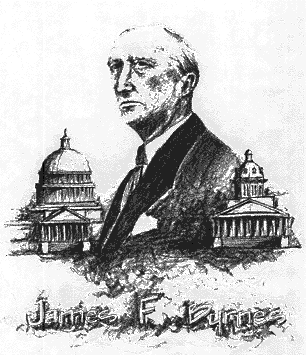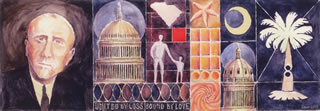Byrnes As Secretary Of State
"Nations, like individuals, differ as to what is right
and just, and dashing appeals to reason may in the long run do more
to avert a clash of arms than a lot of pious resolutions which conceal
honest and serious disagreements." James F. Byrnes

Having
resigned as Director of War Mobilization,
Mr. Byrnes returned home to Spartanburg, SC, in April 1945 to resume
his law practice. Shortly thereafter, President Roosevelt died in Warm
Springs, Georgia, and Byrnes was summoned back to Washington. Several
days later, President Truman asked Mr. Byrnes to be his Secretary of
State. On July 3, 1945, Byrnes was sworn into office in the White House
rose garden.
As Secretary of State, Byrnes was responsible for maintaining good
foreign relations and for helping to create and carry out foreign policy.
It was an exciting time to have such a job since the huge task of rebuilding
a war-torn Europe rested in the hands of the United States, Great Britain
and the Soviet Union.
One of Mr. Byrnes' major goals was to assure that the peoples of Germany
and her allies be allowed to choose their own forms of government.
He was not wholly successful in this matter, however, because the Soviets
quickly established puppet governments in many East European countries
such as Rumania, Bulgaria and Hungary.
Mr. Byrnes was instrumental in all the postwar peace conferences:
the Big Three Meeting at Potsdam, the meetings of the Foreign Ministers
Council in London and Moscow, the United Nations General Assembly in
London, the Big Four Meetings in Paris and the 21-Nation Peace Conference,
also in Paris. He was also committed to establishing the United Nations as an effective international peacekeeping body.
In Search Of Peace

Mr. Byrnes' travels from Yalta to the Paris Peace
Conference
Total approximate mileage, 77,000; dates cover from time of departure
to return to Washington, DC; adapted from a map published in The
New York Times, July 28, 1946.
-
Big Three Meeting, Yalta; January 22, 1945 to February 12, 1945
-
Big Three Meeting, Potsdam; July 6, 1945 to August 7, 1945
-
Foreign Ministers Council, London; September 4, 1945 to October
8, 1945
-
Big Three Foreign Ministers, Moscow; December 12, 1945 to December
29, 1945
-
United Nations. General Assembly, London; January 7, 1946 to January
25, 1946
-
Big Four Foreign Ministers, Paris; April 23, 1946 to May 18, 1946
-
Big Four Foreign Ministers, Paris; June 13, 1946 to July 14, 1946
-
Twenty-one Nation Peace Conference, Paris; July 27, 1946 to October
17, 1946
The last conference Byrnes attended as Secretary of State was the
Council of Foreign Ministers meeting held in New York in November 1946.
It is fitting that his last conference was a Council meeting since
the Council had been created in response to Byrnes' proposal. Here,
as at other meetings, Mr. Byrnes argued fiercely for a fair and lasting
peace, though he was willing to compromise when political and ideological
differences virtually crippled efforts to continue negotiations.
After signing the treaties of peace with five nations, Mr. Byrnes
resigned as Secretary of State in January 1947, feeling his mission
had been completed. Throughout these years of service and in years
after, Byrnes maintained,
"Even a battle with words is better than a battle with bombs."






